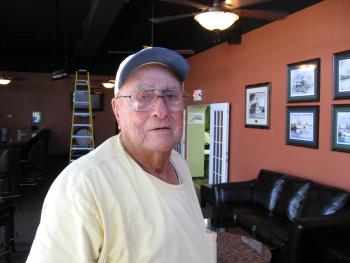Corky Hire

Ethnicity in the Seafood Industry on the Mississippi Gulf Coast
Like any place where hard work could yield fortune, Biloxi’s seafood industry attracted immigrant labor – first Polish by way of Baltimore, then Croatians and Cajuns, and more recently, Vietnamese. Collected here are some of the stories of Biloxi’s shrimping past and present.
Corky Hire may have had an inauspicious beginning to his shrimping career, taking over for his ailing father, but now 70 years later, his memories of working the Gulf are almost all fond ones. His time on boats, through the 30's and 40's, was during a time when Biloxi's seafood industry was growing tremendously and ail schooners were being replaced by powered boats, and Croatian families were making the shift from immigrant laborers to cannery owners and professionals. Corky, the child of immigrants himself, grew up during a time when all his neighbors on land grew grapes for their own wine, when he was hauling in shrimp nets by hand, when ice for the shrimp was in short enough supply that the canneries sent out their own boats to unload fishermen's catch while still at sea. He retired from shrimping in 1955, before the Hurricanes Camille and Katrina, before government-mandated holes in the shrimp nets, before casinos bought up the waterfront, before shrimp importation all combined to threaten the state of the industry as it stands today. His work back then was hard, Corky says, but "There wasn't nothing really hard."
Please Note: The oral histories in this collection are protected by copyright and have been created for educational, research and personal use as described by the Fair Use Doctrine in the U.S. Copyright law. Please reach out Voices@noaa.gov to let us know how these interviews are being used in your research, project, exhibit, etc. The Voices staff can help provide other useful resources related to your inquiry.
The NOAA mission is to understand and predict changes in climate, weather, oceans, and coasts, to share that knowledge and information with others, and to conserve and manage coastal and marine ecosystems and resources. The Voices Oral History Archives offers public access to a wide range of accounts, including historical materials that are products of their particular times, and may contain offensive language or negative stereotypes.
Voices Oral History Archives does not verify the accuracy of materials submitted to us. The opinions expressed in the interviews are those of the interviewee only. The interviews here have been made available to the public only after the interviewer has confirmed that they have obtained consent.
